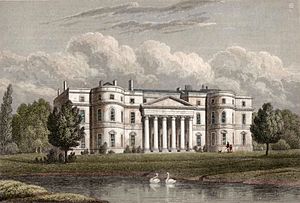Sir Robert Gunning, 1st Baronet facts for kids
Sir Robert Gunning (born June 8, 1731, died September 22, 1816) was an important British diplomat. He worked for Great Britain in several countries. He served as a minister in Denmark from 1765 to 1771. After that, he worked in Prussia in 1771. Then, from 1772 to 1776, he was in Russia. Sir Robert was honored with a special title, Knight Companion of the Order of the Bath, in 1773. He also became the first Baronet of Eltham in Kent in 1778.
Contents
Sir Robert Gunning's Family Life
The Gunning family came from Ireland. Sir Robert's main home in England was at Horton in Northamptonshire. He bought this large house in 1782. He was the oldest son of Robert Gunning and Catherine Edwards. His family was related to Richard Gunning. Richard was an uncle of Peter Gunning, who became the Bishop of Ely. The Gunning family lived at Horton Hall until 1888. Then, it was sold to Pickering Phipps. Later, it was sold again to George Winterbottom.
Sir Robert's Marriages and Children
Sir Robert Gunning married twice during his life.
- On March 27, 1752, he married Elizabeth Harrison. They did not have any children together.
- In 1757, he married Anne Sutton. With Anne, he had a son named George William. George William later inherited his father's title. They also had two daughters. Charlotte Margaret became a maid of honor to Queen Charlotte. She married Stephen Digby in 1790. His other daughter, Barbara Evelyn Isabella, married Major-General Ross in 1795.
Sir Robert's Diplomatic Career
Sir Robert Gunning joined the diplomatic service. This meant he represented his country in other nations. On November 23, 1765, he became the minister resident in Denmark. He arrived there in April of the next year. His job was to help the main British envoy, Walter Titley. He also had to keep the British government informed about events. He did his job well and was very skilled. When Titley died in 1768, Sir Robert became the main envoy in Denmark.
Working in Prussia and Russia
On April 13, 1771, Sir Robert was appointed envoy to Prussia. He left Denmark in June and arrived in Berlin the next month. On December 13, he moved to Russia with the same important rank. He arrived in Russia in June of the next year. The Empress Catherine I of Russia welcomed him very warmly.
His instructions in Russia were clear. He was to offer Britain's help to make peace between Russia and the Ottoman Empire. He also supported the Empress's plans for Poland. But he also tried to ensure religious freedom for different Christian groups there.
Helping the City of Dantzig
Later, Sir Robert was asked to help the city of Dantzig. Dantzig had a problem with the King of Prussia. The King was charging too much money for using Dantzig's harbor. This happened after Poland was divided, and the harbor went to Prussia. Sir Robert spoke to the Russian foreign ministers many times about this. However, he only received unclear answers.
Empress Catherine always treated Sir Robert with great respect. When he dined with her, she often spoke mostly to him. She also met with him privately many times. Once, she even asked him to order four copies of a special Hebrew Bible for her.
Special Recognition and Honors
King George III greatly appreciated Sir Robert's work. Without being asked, the King made him a Knight Companion of the Order of the Bath in 1773. The King asked the Empress to perform the knighting ceremony. She agreed and chose July 9, her own anniversary, for the event. After the ceremony, she gave Sir Robert the gold sword she had used to knight him. The sword was decorated with diamonds.
Negotiations for Troops
In 1775, Sir Robert was asked to talk to the Russian foreign minister, Panin. The British government wanted to know if Russia could provide troops. These troops might be needed for service in North America. Sir Robert received encouraging answers from Panin and later from the Empress herself.
A negotiation began for 20,000 Russian soldiers. They would be fully equipped and sent to Canada. They would fight against the American colonies that had rebelled. However, the negotiation fell apart. The British government wanted the Russian officers to promise loyalty to the British crown. This was used as a reason to stop the deal. Lord Suffolk praised Sir Robert's actions during this time. In November, he asked to return home due to poor health.
Sir Robert Gunning died at his home in Horton, near Northampton, on September 22, 1816.


